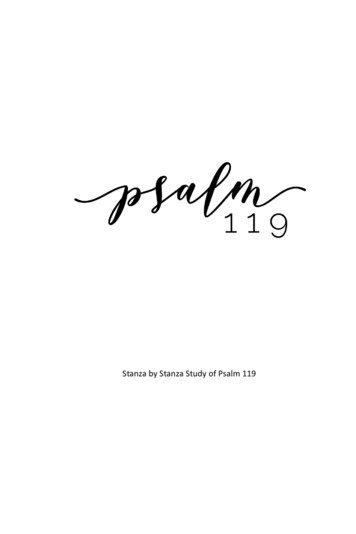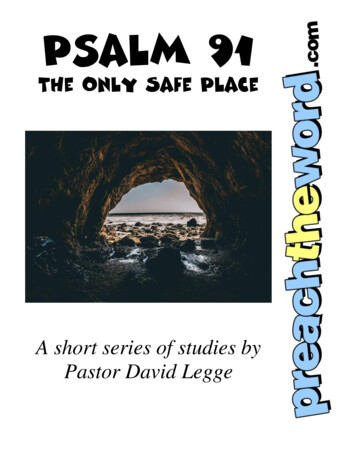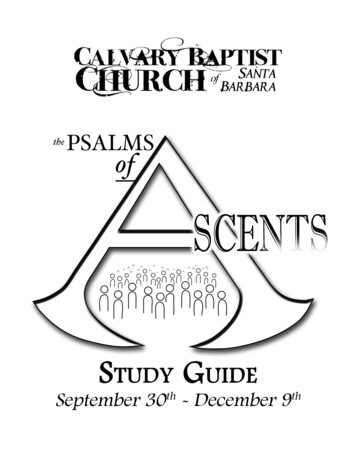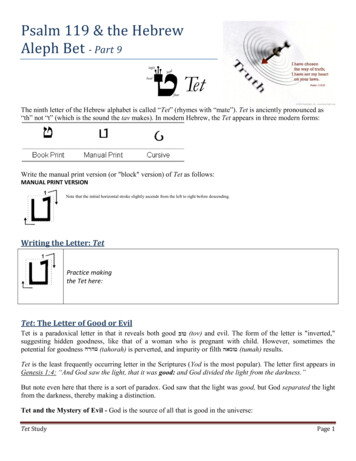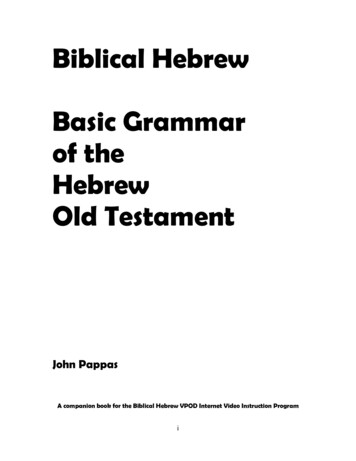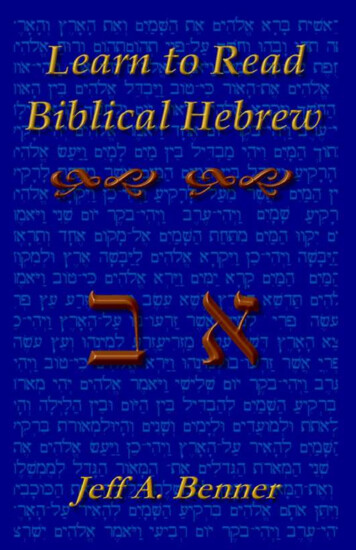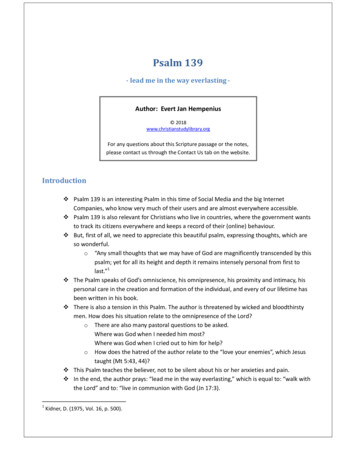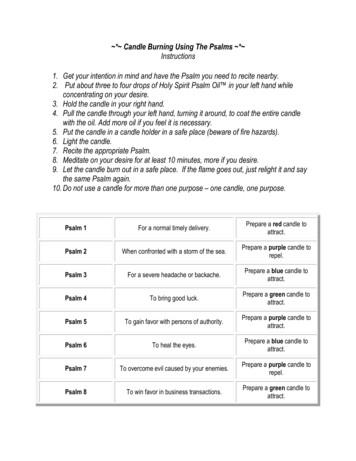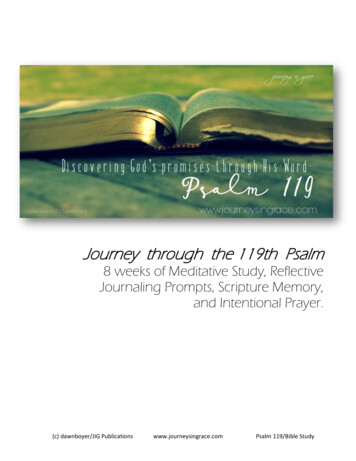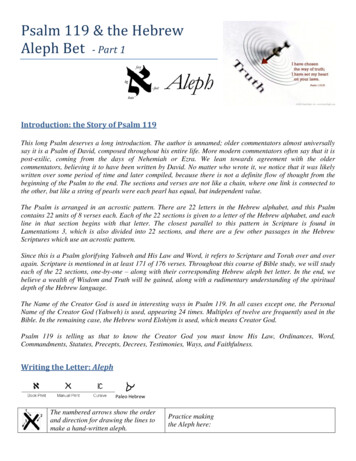
Transcription
Psalm 119 & the HebrewAleph Bet - Part 1Introduction: the Story of Psalm 119This long Psalm deserves a long introduction. The author is unnamed; older commentators almost universallysay it is a Psalm of David, composed throughout his entire life. More modern commentators often say that it ispost-exilic, coming from the days of Nehemiah or Ezra. We lean towards agreement with the oldercommentators, believing it to have been written by David. No matter who wrote it, we notice that it was likelywritten over some period of time and later compiled, because there is not a definite flow of thought from thebeginning of the Psalm to the end. The sections and verses are not like a chain, where one link is connected tothe other, but like a string of pearls were each pearl has equal, but independent value.The Psalm is arranged in an acrostic pattern. There are 22 letters in the Hebrew alphabet, and this Psalmcontains 22 units of 8 verses each. Each of the 22 sections is given to a letter of the Hebrew alphabet, and eachline in that section begins with that letter. The closest parallel to this pattern in Scripture is found inLamentations 3, which is also divided into 22 sections, and there are a few other passages in the HebrewScriptures which use an acrostic pattern.Since this is a Psalm glorifying Yahweh and His Law and Word, it refers to Scripture and Torah over and overagain. Scripture is mentioned in at least 171 of 176 verses. Throughout this course of Bible study, we will studyeach of the 22 sections, one-by-one – along with their corresponding Hebrew aleph bet letter. In the end, webelieve a wealth of Wisdom and Truth will be gained, along with a rudimentary understanding of the spiritualdepth of the Hebrew language.The Name of the Creator God is used in interesting ways in Psalm 119. In all cases except one, the PersonalName of the Creator God (Yahweh) is used, appearing 24 times. Multiples of twelve are frequently used in theBible. In the remaining case, the Hebrew word Elohiym is used, which means Creator God.Psalm 119 is telling us that to know the Creator God you must know His Law, Ordinances, Word,Commandments, Statutes, Precepts, Decrees, Testimonies, Ways, and Faithfulness.Writing the Letter: AlephPaleo HebrewThe numbered arrows show the orderand direction for drawing the lines tomake a hand-written aleph.Practice makingthe Aleph here:
Spiritual Meaning of the AlephAleph 1 and is A, E, I, O, U of Hebrew The Aleph is one letter, made up of three other Hebrew letters, signifying ONE and singly representing YAH. Because it is one letter comprised of three letters, it shows the three aspects of YAH. The three parts are: an upper and lower yod and a middle vav.The yod is the smallest letter of The vav is the number 6, being thethe Hebrew alphabet. It portrays anumber of MAN. It shows thatHAND and signifies WORK,YAH manifested in the flesh anddone with the hand. Hands havebecame a MAN for our Salvation.10 fingers. So it signifies theOf all YAH’s Work on earth, thisWork of Yahweh in Creation andis the most powerful, thus it isin writing the 10 Commandments.fitting that it be part of the aleph –The upper yod in the aleph isbeing the letter signifying powerreaching down, showing Yahwehand strength. The vav meansreaching down to mankind.HOOK or NAIL and is aCONNECTOR, showing how“For Thou, Yahweh, hast madeYahweh connects lost mankind tome glad through Thy Work: I willHimself through the Redemptiontriumph in the Works of Thyof Calvary and the nails whichHands,” Psalm 92:4.pierced Yahshua’s Hands.“And it shall come to passafterward, that I will pour out MySpirit upon all flesh in thoseThe lower yod shows the WORKdays will I pour out My Spirit.”ofYahweh in sending His SPIRITJoel 2:27-29to mankind.“And it shall come to passafterward, that I will pour out MySpirit upon all flesh in thosedays will I pour out My Spirit.”Joel 2:27-29Not only do the parts of the Aleph deepen its meaning, thewhole of the Aleph reveals a powerful, overall message. TheAleph, as a whole, is the ox. This was very plain in its originalform, for the Aleph was drawn as a pictorial ox-head:The Aleph, as the ox, shows the STRENGTH and POWER ofYahweh. It is the letter that singly represents YAH – thus, everyword beginning with an Aleph, is predominantly a message andrevelation about Yahweh (see the following page).Trinity? The Aleph is the letter of Yah, revealing His Work andNature. It clearly shows the Trinity doctrine to be false. There isonly ONE (echad – which starts with aleph) God. This does not takeaway the divinity of Yahshua, rather it deepens it! Yahshua is Yahmanifested in the flesh! (See 1 Timothy 3:16, John 14:8-9, Isaiah9:6). Matthew 28:19 was manipulated by Rome, changed to speak ofa Trinity – which wasn’t in the original!)The symbol suggests an eternal linkbetween the Creator with everything thatemanates from Him. As One Who iscomposed by both the upper realm ofHeaven and the lower realm of the earth,connected by the humility of the body,Aleph is a picture of the God-Man unity,or the Divine Man – Yahshua, Yahmanifested in the flesh.Aleph’s simple apparent value is 1.But its inherent hidden numericalvalue is 111 (because the letter alephis spelled: Aleph Lamed Peh: 1 30 80 111).The shape of Aleph is composed oftwo Yods and a dividing line whichstands for the letter Vav). This givesanother numerical value: 10 10 6 26. The number 26 is the value ofthe tetragrammatron YHWH, orYahweh, the Covenant Name of YAH.
Hebrew Words Beginning with Aleph:Hebrew WordPronunciationMeaning ﬡﬤ Av or Ab ﬡﬤﬡ AbbaFather – Yah is our ultimate Father. All fathers are to showYahweh, following His Pattern.Daddy – the most intimate reference to one’s Father ﬡﬣיִﬣ A’hyahI AM – Yah is the Self-Existent, Eternal One ﬡﬥ ElGod – Mighty One - singular אחד hOne – United, first – see Deut. 6:4 ﬡﬧﬦ Adam ﬡיִשׁ Enash ﬡשׁ IshFire – Yah is a consuming FIRE – Deut. 4:24 ﬡוֹﬧ OrLight – Yah is the Source of all LIGHT – 1 John 1:5 ﬡﬣﬤﬣ AhabahLove – Yah is LOVE – 1 John 4:8Red – man was created in Yah’s ImageAdam - ﬡ blood (bloodshed happens when man leaves God)ManMan - ﬡ substance (when God is removed from man, whatremains is merely substance)The Mighty Aleph Tav:The Aleph is the first letter of the Hebrew alphabet. The Tav is the last letter. The Messiah Yahshua said that Heis the Aleph and the Tav, the First (rishon) and the Last (acharon), and the Beginning (rosh) and the Ending(sof): I am the Aleph and the Tav, (Alpha and Omega in Greek) the beginning and the end, the first and the last(Rev. 22:13). ﬡﬨ When Yahshua said this, He was making a direct reference to Isaiah 41:4, 44:6, and 48:12, where YahwehHimself says that He is the First and the Last -- and explicitly declared that there is no other “god” beside Him.Yahshua was stating that He was the One to whom the references in Isaiah pertain. He is the “direct object” ofwhich the Scriptures speak (see about the role of the direct object marker).Yahshua also said He was the Truth of God Himself:I Am the Way and the Truth and the Life; no man comes to the Father apart from Me (John 14:6).
Notice that the word for truth(emet) contains the first letter , the middle letter , and the last letter of theHebrew alphabet, which the Jewish sages say means that the truth contains everything from Aleph to Tav:The Hebrew word emet has a more concrete meaning than the English word for "truth" (the English wordderives from the Greek/Western view of truth as a form of correspondence between language and reality, butinvariably languished over epistemological questions that led, ultimately, to skepticism). In the Hebraicmindset, the person who acts in emet is one who can be trusted (Gen. 24:49; 42:16; 47:26; Josh. 2:14). Actions,speech, reports, or judgment are emet because they are reliable (Dt. 13:14; 22:20; 1 Kg. 10:6; 22:16; Pr. 12:19;Zech. 8:16). If a seed is a seed of emet, its quality is trustworthy (Jer. 2:21).In the Tanakh, emet is often coupled with chesed, covenant faithfulness, which designates Yahweh’s loyalty infulfilling His Promises and His Covenant. For example, God's emet and chesed were majestically revealed ingiving the Covenant at Sinai (Ex. 34:6).The LORD, The LORD God, merciful and gracious, longsuffering, and abundant in goodness and truth (Exodus34:6).Indeed, Pilate's question, "What is truth?" is a category mistake, since truth is not about "what" but about"Who." That is, truth is not something objective and static, a thing to be known and studied from a distance. No.Truth is essentially personal. It is personal disclosure of the character of the subject. Understood in this way,Truth is a way of living, a mode of existence, a relational truth.He is the true Light, who lights every man that comes into the world (John 1:9).Interestingly, Aleph and Tav form a unique word that functions as a "direct object marker" in the both Biblicaland modern Hebrew:As it is written in Genesis 1:1, "In the beginning God (ALEPH/TAV) created the heavens and the earth."
Considered this way, Yahshua is the Direct Object of the Universe, the End (sof) of all of creation. And not onlyis Yahshua the End of all creation, but He is the "Beginning," the Creator and Sustainer of all things: "For byHim were all things created that are in heaven, and that are in earth, visible and invisible, whether they bethrones, or dominions, or principalities, or powers: all things were created by him and for him: And He is beforeall things and by Him all things consist." (Colossians 1:16-17)Thus says the Amen, the faithful and true witness, the beginning of the creation of God (Rev. 3:14).Yahshua is the Strong SignFinally, using the ancient pictographs of Paleo Hebrew,we can see that Yahshua is the "Strong Sign" fromAdonai:He is the One who comes in humble, silent strength(Aleph) bearing the Sign of the true Covenant of God(Tav).
Keyword Study: Psalm 119:1-2“ALEPH. Blessed are the undefiled in the way, who walk in the Law of the LORD. Blessed are they thatkeep His Testimonies, and that seek Him with the whole heart.Strong’s #Hebrew WordBlessedH835'esherUndefiledH8549tam 8Keyword יהוה ey hovahMeaninghappiness; only in masculine plural construction asinterjection, how happy!: - blessed, happyEntire, integrity, truth: - without blemish, complete, full,perfect, sound, without spot, undefiled, upright, wholea road; figuratively a course of life or mode of action,conversation, custom, manner, [path-] wayto walk (literally and figuratively): behave (self), come, (on)continually, be conversanta precept or statute, especially the Decalogue orPentateuch: - law(the) self Existent or eternal; Jehovah, Jewish nationalname of God. (Note: the V is interchanged as W YHWH)KeepH5341natsarto guard, (to protect, maintain, obey, etc.) keep (-er, -ing),monument, observe, preserve (-r), subtil, watcher (-man)TestimoniesH5713‛edahtestimony: - testimony, witnessSeekH1875darashHeartH3820lebto tread or frequent; to follow (for pursuit or search); byimplication to seek or ask; specifically to worship: - ask,care for, diligently, inquire, make inquisitionthe heart; also used (figuratively) very widely for thefeelings, the will and even the intellectRewrite these 2 verses using the fuller meaning you found in your Keyword study above:Happy are those who live pure lives, who follow, protect and keep the YAHWEH’s Torah. They are faithful watchmen whohave the Testimony of Yahshua and are Witnesses of the transforming power of Yah. Happy are those who keep Hisrules, who obey Him with their whole hearts.Keyword Study: Psalm 119:3-4They also do no iniquity: they walk in His Ways. Thou hast commanded us to keep Thy Precepts diligently.KeywordStrong’s #Hebrew akWaysH1870derekCommandedH6680tsavahMeaningto do or make (systematically and habitually), especially topractice: - commit, [evil] doer, make, ordain, worker(moral) evil: - iniquity, perverseness, unjust (-ly),unrighteousness (-ly), wicked (-ness)to walk (literally and figuratively), behave (self),continually, be conversant, be eased, follow, grow, be wontto haunt, lead, move (self), tale-bearer, travel (-ler)a road (as trodden); a course of life or mode of action, oftenconversation, custom, mannerto constitute, enjoin: - appoint, (for-) bid. (give a) charge,command (-er, ment), put, (set) in order
e'odto hedge about (as with thorns), guard; protect, attend to,beware, be circumspect, take heed (to self), keep, mark,look narrowly, observe, preserve, regard, reserve, save(self), sure, (that lay) wait (for), watch (-man).properly appointed, that is, a mandate (of God; plural only,collectively for the Law): - commandment, precept, statutevehemence, vehemently; wholly, speedily, diligently,especially, exceeding (-ly), might (-ily, -y), quickly, wellRewrite these 2 verses using the fuller meaning you found in your Keyword study above:Those who love Yahweh don’t choose to habitually practice or do what is wicked, according to Yah’s Word. They follow,are comfortable in, obey and are conversant in Yahweh’s Ways and Course of Life. Yahweh gave [commanded] HisTorah orders [precepts], which are to be observed, obeyed, guarded, and valued completely, quickly, andwholeheartedly by all who love and worship Yahweh.Keyword Study: Psalm 119:5-6O that my ways were directed to keep Thy Statutes! Then shall I not be ashamed, when I have respect untoall Thy Commandments.KeywordO ThatStrong’s #Hebrew WordMeaningH305'achalaywould that!: - O that, would God.Were DirectedH3559kunThy StatutesH2706choqThenH227'azBe itsvahto be erect (that is, stand perpendicular), to set up,(establish, fix, prepare, apply), (appoint, render sure,proper or prosperous), faithfulnessan enactment; an appointment (of time, space, quantity,labor or usage): bound, commandment, custom, decree,due, law, necessary ordinance, portion, set time, statuteat that time or place; also as a conjugation, therefore: beginning, for, from, hitherto, now, of old, once, since, then,at which time, yetto pale, that is, by implication to be ashamed; also (byimplication) to be disappointed, or delayed: - (be, make,bring to, cause, put to, with, a-) shame (-d), be (put to)confounded (-fusion), become dry, delay, be longthat is, look intently at; by implication to regard withpleasure, favor or care: - (cause to) behold, consider, look(down), regard, have respect, seea command, whether human or divine (collectively theLaw): - (which was) commanded (-ment), law, ordinance,preceptRewrite these 2 verses using the fuller meaning you found in your Keyword study above:It is my deepest heart’s desire that my habits of life, choices, conversation and way of life would stand up like amonument of faithfulness to Yahweh! This happens when I am mindful of, and obedient to and living byYahweh’s Statutes. When I find pleasure in and respectfully regard Yahweh’s Commandments, I will not beconfounded, spiritually dry, pale with shame on Judgment Day, or disappointed in the End.
Keyword Study: Psalm 119:7-8I will praise Thee with uprightness of heart, when I shall have learned Thy righteous Judgments. I willkeep Thy Statutes: O forsake me not utterly.”KeywordStrong’s #Hebrew WordMeaningPraiseH3034yadahto use (that is, hold out) the hand; to revere or worship(with extended hands); (make) confess (-ion), praise,(give) thanksUprightnessH3476yosherthe right: - equity, meet, right, upright he heart (as the most interior organ); bethink themselves,breast, comfortably, courage, mind, understandingto goad, to teach (the rod being an Oriental incentive): [un-] accustomed, diligently, expert, instruct, learn, skillfulteach (-er, -ing)the right, equity, prosperity: just, justice, righteousa verdict (favorable or unfavorable), judicially, a sentenceor formal decree, divine law, justice, determinationto hedge about (as with thorns), guard; protect, attend to,beware, be circumspect, take heed (to self), keep, mark,look narrowly, observe, preserve, regard, reserve, save(self), sure, (that lay) wait (for), watch (-man).an enactment; an appointment (of time, space, quantity,labor or usage): bound, commandment, custom, decree,due, law, necessary ordinance, portion, set time, statuteto loosen, relinquish, permit, commit self, fail, forsake,fortify, help, leave (destitute, off), refusevehemence, vehemently; wholly, speedily, diligently,especially, exceeding (-ly), might (-ily, -y), quickly, wellRewrite these 2 verses using the fuller meaning you found in your Keyword study above:I will praise and give thanks to You with uprightness of heart and the right thinking, when I learn [by sanctifiedexperiences and Your loving Instruction] Your righteous judgments [Your verdicts on behalf of obedience andpunishments against lawless thought and conduct]. I will keep Your Statutes, including your appointments,Commandments, and Law. O forsake me not utterly, nor relinquish Your claim over my soul. Please, neverleave me!
Psalm 119:1-8 Reveals the Aleph Message:Go deeper in your understanding of the Aleph message by putting what you have found all together now.Explain the meaning of the Aleph words, combined with the contextual meaning of the verse around it (use yourrewriting of the verses to help with this part). A few have been done for you, to show how this works.VersePsalm 119:1-2AlephWord אשׁר English WordBlessed'esherPsalm 119:3 אף 'aphPsalm 119:4Psalm 119:5 אּתה 'attah אּתה 'attahThey also (oryes)Thou (You)O that! (Wouldthat! I wishthat!)Message of Aleph revealed in the Word and Verse:Word Message: Blessed is to be exceedingly happy,fulfilled and joyful. Only Yahweh can bless me!Verse Context Message: I will only experience Yahweh’sfull blessing, when I walk according to His Law, keepingHis Statutes.Word Message: aph refers to affirmation and accession(concurrence, agreement).Verse Context Message: It gives the concept that when welive in Grace-empowered works instead of lawlesswickedness, we are brought into agreement or concord withHeaven.Word Message: Because nothing can exist withoutYahweh, as Creator, state of being verbs like I AM, I Will,You, etc. start with aleph (He is Eternal. There is no state ofbeing outside of Him.)Verse Context Message: We honor Him as our Source ofexistence, recognizing Him as the Creator, by obeying HisPrecepts.Word Message: Our heartfelt desires are to be foundedupon Yahweh. As such, they are prayers which He delightsto grant (Psalm 37:4)Verse Context Message: When we desire to have lifepatterns, habits and behaviors that are obedient to Yahweh’sStatutes, this desire is from Him. It is a prayer He will grant!
VersePsalm 119:6AlephWord אז 'azPsalm 119:7-8 אַﬣיִﬣ a’hyahEnglish WordThen (at thattime)I Will (I Am)Message of Aleph revealed in the Word and Verse:Word Message: Az is a Hebrew word encompassing past,present and future.Verse Context Message: From of old, those who considerand heed Yahweh’s Commandments have nothing to fear onJudgment Day. I also, if I live according to His Torah, canlook forward to a future without shame.Word Message: I Will is another form of I Am. Thus,whenever Yahweh tells us that He Will do something, He isreminding us of His Great Power and unfailing Promise tocomplete it! Also, when we say “I will,” we are invokingYahweh’s Name in a vow, which we must carry out. To seethis, study H1961 (translated as I Am, and more )Verse Context Message: As children of Yahweh, we vowto seek His Truth, praising Him for whatever He reveals inthat study/search, no matter what inconvenience it brings orwhat it costs. Also, we are vowing to obey what we learn,by His Grace (Numbers 30:2, Psalm 15:4)Personal Application:1. Why is the aleph known as the “letter of Yah”? What does this mean to you? – It shows the triuneNature of Yah and even reveals the skeletal message of Salvation. The aleph also reveals Yahweh as myHeavenly Father. It is the letter showing Yahweh’s supremacy and that He is to be kept First in my heartand home.2. What was the most personally meaningful message of the aleph that you found in this study? – Thealeph shows how Yahweh, the Creator, is connected to me, His Creation.3. What insights about Yahweh did you gain? – There was a deeper sense of the true JOY of obedience,which I came to comprehend. Not that I didn’t know keeping the Torah brought joy, it’s just that I saw,even more deeply, how I should seek to fully delight in His Ways, and in so-doing, my life will be ablessing and a delight. Deviating from His Will cannot bring true joy. Thus, I saw that Yahweh is a GodWho truly wants His children to be happy, blessed and fulfilled.
Notice that the word for truth (emet) contains the first letter , the middle letter , and the last letter of the Hebrew alphabet, which the Jewish sages say means that the truth contains everything from Aleph to Tav: The Hebrew word emet has a more concrete meaning than the English word for "truth" (the English word derives from the Greek/Western view of truth as a form of correspondence .
